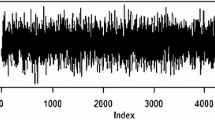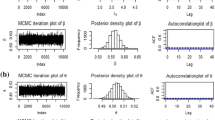Abstract
We consider a multicomponent load-sharing system in which the failure rate of a given component depends on the set of working components at any given time. Such systems can arise in software reliability models and in multivariate failure-time models in biostatistics, for example. A load-share rule dictates how stress or load is redistributed to the surviving components after a component fails within the system. In this paper, we assume the load share rule is unknown and derive methods for statistical inference on load-share parameters based on maximum likelihood. Components with (individual) constant failure rates are observed in two environments: (1) the system load is distributed evenly among the working components, and (2) we assume only the load for each working component increases when other components in the system fail. Tests for these special load-share models are investigated.
Similar content being viewed by others
References
Z. Birnbaum and S. Saunders, “A statistical model for life-length of materials,” J. Am. Stat. Assoc. vol. 53 pp. 151–160, 1958.
B. Coleman, “Time dependence of mechanical breakdown in bundles of fibers, i. Constant total load,” J. Appl. Phys. vol. 28 pp. 1058–1064, 1957a.
B. Coleman, “Time dependence of mechanical breakdown in bundles of fibers, ii. The infinite ideal bundle under linearly increasing loads,” J. Appl. Phys. vol. 28 pp. 1065–1067, 1957b.
D. R. Cox, Prediction Intervals and Empirical Bayes Confidence Intervals, Academic Press: Cambridge, UK, 1975.
H. E. Daniels, “The statistical theory of the strength of bundles of threads,” Proc. R. Soc. London Ser. A vol. 183 pp. 405–435, 1945.
B. Glanz and E. Lipton, “The height of ambition: In the epic story of how the world trade towers rose, their fall was foretold,” NY Times Mag. vol. 8, (September) pp. 32–63, 2002.
D. G. Harlow and S. L. Phoenix, “The chain-of-bundles probability model for the strength of fibrous materials 1: Analysis and conjectures,” J. Compos. Mater. vol. 12 pp. 195–214, 1978.
D. G. Harlow and S. L. Phoenix, “Probability distributions for the strength of fibrous materials under local load sharing 1: Two-level failure and edge effects,” Adv. Appl. Prob. vol. 14 pp. 68–94, 1982.
M. Hollander and E. A. Pena, “Dynamic reliability models with conditional proportional hazards,” Lifetime Data Anal. vol. 1 pp. 377–401, 1995.
S. Lee, S. Durham, and J. Lynch, “On the calculation of the reliability of general load sharing systems,” J. Appl. Prob. vol. 32 pp. 777–792, 1995.
H. Liu, “Reliability of a load-sharing k-out-of-n: G system: Non-iid components with arbitrary distributions,” IEEE Trans. Reliab. vol. 47(3) pp. 279–284, 1998.
W. Q. Meeker and L. A. Escobar, Statistical Methods for Reliability Data, John Wiley: New York, 1998.
J. M. Ortega and C. R. Rheinbold, Iterative Solution of Nonlinear Equation in Several Variables, Academic Press: New York, 1970.
S. Phoenix, “The asymptotic time to failure of a mechanical system of parallel members,” SIAM J. Appl. Math. vol. 34 pp. 227–246, 1978.
B. W. Rosen, “Tensile failure of fibrous composites,” AIAA J. vol. 2 pp. 1985–1991, 1964.
S. M. Ross, “A model in which component failure rates depend on the working set,” Naval Res. Logist. Q. vol. 31 pp. 297–300, 1984.
Z. Schechner, “A load-sharing model: The linear breakdown rule,” Naval Res. Logist. Q. vol. 31 pp. 137–144, 1984.
F. T. Wright, T. Robertson, and R. L. Dykstra, Order Restricted Statistical Inference, Wiley: New York, USA, 1988.
Author information
Authors and Affiliations
Rights and permissions
About this article
Cite this article
Kim, H., Kvam, P.H. Reliability Estimation Based on System Data with an Unknown Load Share Rule. Lifetime Data Anal 10, 83–94 (2004). https://doi.org/10.1023/B:LIDA.0000019257.74138.b6
Issue Date:
DOI: https://doi.org/10.1023/B:LIDA.0000019257.74138.b6




